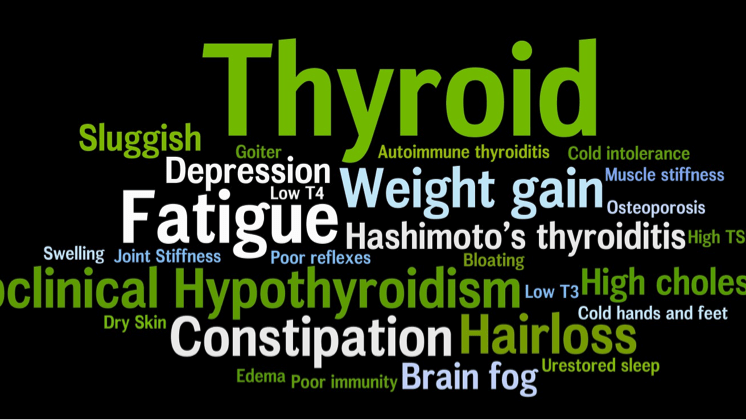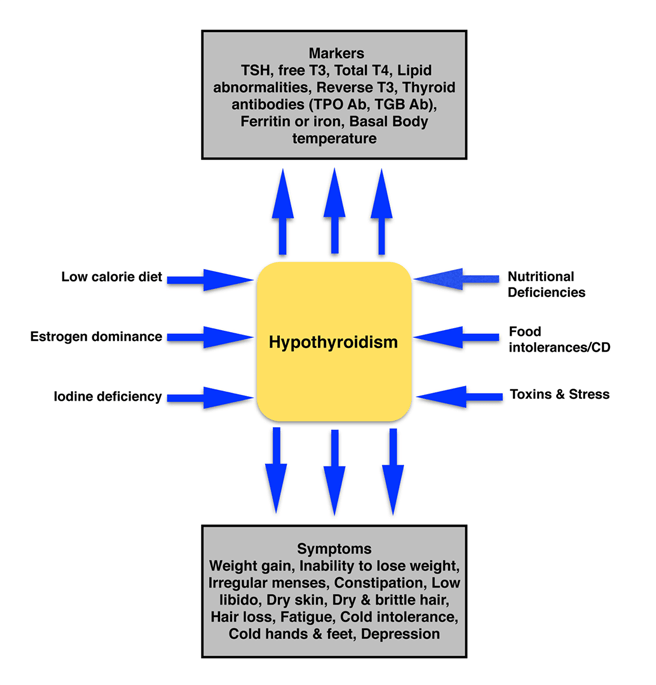Symptoms of Hypothyroidism
- Anxiety
- Diarrhoea
- Fatigue
- Hair Loss
- Insomnia
- Weight Loss
- Palpitations
- Rapid Heart Beat
- Sweating
- Weakness
1. Stress affects thyroid hormones
The adrenal gland respond to any kind of stress in the body. It releases an important hormone, Cortisol. Under stress, the body releases cortisol to cope and recover from stress. This actually on when and where basis. A very common example of chronic stress is consistent low-calorie diet.
Low-calorie intake forces the adrenals to work harder and release cortisol more often in order to maintain blood sugar levels. This is necessary for energy supply to muscle tissues & vital organs in the body such as the heart, lungs and brain. If your adrenals pump cortisol consistently for longer periods it can have serious affect on thyroid functioning and other metabolic processed.
Chronically high cortisol levels directly inhibit the conversion of inactive T4 to active T3. It also increases the production of reverse T3. Reverse T3 acts as negative loop feedback and shut down the production of TSH. Chronic stress affects cortisol levels and hence thyroid functioning.
2. Gut health is important for Thyroid functioning
Any kind of dysbiosis or pathogenic infection in the GI tract can put the adrenals on fire. These infections or unhealthy microflora acts as a stressor. Chronic infections make the body releases excess cortisol in order to neutralise them.
Higher cortisol levels & intestinal dysbiosis make the intestinal mucosa more permeable. The increased permeability allows more antigens or other debris to enter the bloodstream.
Our Immune system becomes react by producing antibodies to a threat. After the threat is neutralised everything come back to normal. But if threat remains active for a long time then it becomes chronic. This chronic threat leads to an Overactive Immune response.
This overactive immune system with excess of antibodies increases the risk of Autoimmune diseases. The poor digestive system also depletes the body of essential nutrients.
Nutrients such as iron, zinc, vitamin A & D, selenium and tyrosine are essential for the functioning of thyroid gland. Gut Health plays a key role to keep thyroid imbalances in check.
3. Insulin resistance/dysglycemia inhibits thyroid gland and its hormones production
Dysglycemia means fluctuating blood sugar levels and/or inability of the body to maintain or utilise sugar effectively. Eating food high in sugar, refined carbohydrates, processed foods and diet low in fibre, sugar levels rise and drop quickly.
A sudden drop in sugar levels makes us feel hungry. If we are hungry and there is no fuel available. Then the body releases more cortisol to tackle the situation. This condition arises in cases of underfeeding for longer periods or crash diets.
Excess sugar or refined carbohydrate consumption leads to intestinal dysbiosis or small intestinal bacterial overgrowth. This is one of the reasons for Obesity. It further causes nutritional deficiencies or leads to a more inflammatory state. This again adds excess burden on the hypothalamus-pituitary-adrenal axis (HTPA Axis). This can cause thyroid imbalances leading to Hypothyroidism, a condition referred to as thyroid disease.
4. Food sensitivities like Gluten intolerance or sensitivity can lead to Hashimoto disease
Various studies confirm that gluten intolerance (Celiac disease) or gluten sensitivity can lead to an thyroid autoimmunity. Gluten sensitivity or intolerance increases intestinal permeability, a condition known as Leaky gut syndrome.
Leaky gut is a major cause of autoimmune disease. Leaky gut causes the antigens, pathogens or undigested food particles especially protein to leak into the system through the intestine.
The body produces antibodies to neutralise the threat. The excess of antibodies production haphazardly attacks any organs or system in the body. If the affected cells are thyroid, then it causes an autoimmune condition known as Hashimoto thyroiditis, an autoimmune thyroids disease.
5. Environmental toxins are thyroid disruptors
There are more than 100 chemicals which act as thyroid disruptors. They block thyroid hormones from attaching themselves to thyroid receptors on the cells. Bisphenol A (BPA) found in lots of plastic products, PCB’s and dioxins are well known thyroid disruptors.
How RH+ helps?
RH+ helps you find the underlying cause, triggers or stressors responsible for your thyroid imbalances rather than just focusing on the symptoms. We help you manage your thyroid disease more effectively and in the safest manner. It includes covering nutritional deficiencies & removing the triggers.
If you still suffering from symptoms like hair fall, skin issues, depression, constipation or weakness despite taking your medicines regularly. Then its time to re-evaluate your treatment plan.


